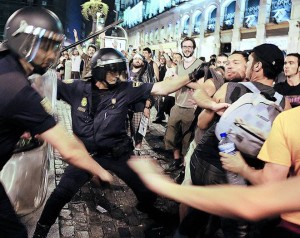All Roads Lead to Repression
 Here’s a thought someone put in my inbox – and a good one.
Here’s a thought someone put in my inbox – and a good one.
The major paradox of the Chávez era is what you might call the Case of the Missing Repression: governments as authoritarian as Chávez’s, with an eliminationist rhetoric towards opponents and all state power consolidated under a single leader are normally far, far more violent and repressive than Chávez’s has been.
Now, what accounts for the missing repression? Why are there no gulags? Why are there dozens of political prisoners rather than hundreds, or thousands? Basically, because Chávez has been able to substitute three things for repression:
- Charisma
- Petrodollars
- Personal authority
His charisma did much to keep his base in line, even as the government failed to deliver across a range of issues. The petrochequera allowed him to co-opt opponents wholesale, be it via the populist spending binge or, say, the extraordinary profits it made available to groups such as the banking industry. And his personal authority within revolutionary ranks served as an effective mechanism for settling internal disputes: fights couldn’t fester, because Chávez’s word was final.
Now, as Chávez exits the scene, one thing is clear: the next government will have none of these available. Which strongly suggests that the first post-Chávez government will be more – and possibly much more – authoritarian than Chávez’s: the era of charming people into submission, or buying them into submission or badgering them into submission is coming to an end, and all that leaves is the era of beating people into submission.
Caracas Chronicles is 100% reader-supported.
We’ve been able to hang on for 22 years in one of the craziest media landscapes in the world. We’ve seen different media outlets in Venezuela (and abroad) closing shop, something we’re looking to avoid at all costs. Your collaboration goes a long way in helping us weather the storm.
Donate




